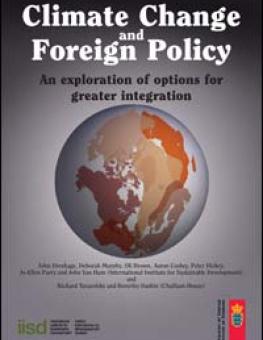
Climate Change and Foreign Policy: An exploration of options for greater integration
Climate change is one of the greatest challenges of this century. Increasing evidence of the impacts of climate change and that human actions are contributing to changes in climate highlights the need for action. There is an increasing realization in the international community that achieving the consensus and commitment needed to take action requires positioning climate change in a broader foreign policy context.
The ostensible goal of Western foreign policy is to provide stability and security as a foundation for human well-being, global freedom and prosperity. However, in today's increasingly inter-connected world, the traditional instruments of diplomacy are not always effective in tackling global threats. Established alliances and procedures are hard-pressed to be effective against a threat such as climate change, when the cause (greenhouse gas emissions) is not the ambition of any one "hostile" power. Addressing the climate change challenge requires new thinking in foreign policy—thinking that considers engagement on climate change not only in the sphere of environment, but also outside the environment box.
This study examines opportunities for a broader framing of the climate change issue in a number of foreign policy areas of the Ministry of Foreign Affairs of Denmark: diplomacy and international relations; energy security; peace and security; trade and investment; and development cooperation.
Co-authored by IISD's John Drexhage, Deborah Murphy, Oli Brown, Aaron Cosbey, Peter Dickey, Jo-Ellen Parry and John Van Ham; and Richard Tarasofsky and Beverley Darkin of Chatham House.
Additional downloads
You might also be interested in
December 2024 | Carbon Minefields Oil and Gas Exploration Monitor
In November 2024, 23 oil and gas exploration licences were awarded across five countries, with Russia granting the licences that account for the largest portion of embodied emissions.
Toward a Coherent, Transformative Approach to Financing Sustainable Development, Climate, and Nature
Four key proposals for the Fourth Financing for Development Conference (FfD4) to create an integrated, equitable approach to financing climate, nature, and development goals.
Green Public Procurement in India
This report analyzes the status of green public procurement (GPP) in India and suggests key strategies for advancing sustainable procurement practices.
Sustainable Asset Valuation (SAVi) of a Small-Scale Tree Planting Initiative in Côte d'Ivoire
This report analyzes the social, economic, and environmental outcomes of a small-scale tree planting initiative at schools in Côte d'Ivoire.